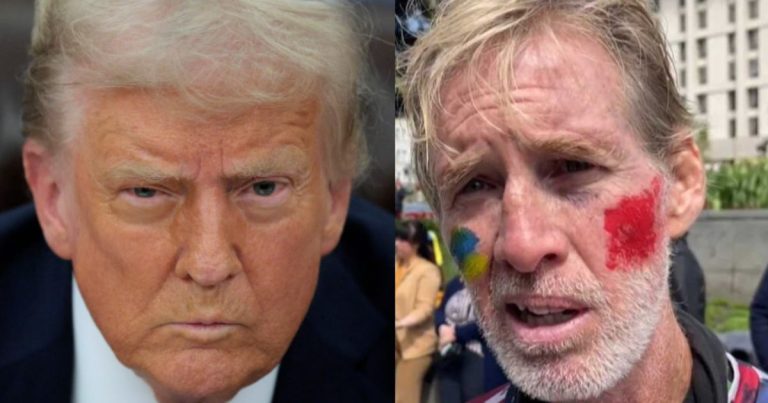
Last September, Americans were shocked when Secret Service agents thwarted an assassination attempt against President Donald Trump at his West Palm Beach golf club. Ryan Wesley Routh, the 58-year-old suspect, was apprehended after dropping his rifle and fleeing the scene.
Court documents revealed Routh had positioned himself in bushes outside Trump’s golf course with a semi-automatic rifle. A vigilant Secret Service agent spotted the weapon’s muzzle protruding through the shrubs before Routh could fire, prompting his escape. He was captured about 40 minutes later.
What initially appeared to be a lone-wolf attack has taken a disturbing turn. According to bombshell court filings, this wasn’t just a spontaneous act of violence.
Just weeks before attempting to assassinate President Trump, Routh tried to purchase a rocket launcher from Ukraine, prosecutors revealed Monday. The would-be assassin communicated through an encrypted messaging app with someone he believed had access to military-grade weapons. Let that sink in – a would-be presidential assassin was shopping for weapons from a war zone.
From ‘The New York Post’:
In one exchange, which unfolded via an encrypted messaging app, Routh allegedly asked the associate to “send me an RPG [rocket-propelled grenade] or Stinger and I will see what we can do… [Trump] is not good for Ukraine.”
Ukraine Connection Revealed in Court Documents
The communications unveiled by prosecutors paint a chilling picture of Routh’s intentions.
“I need equipment so that Trump cannot get elected,” he allegedly wrote to his Ukrainian contact. These messages provide crucial evidence of premeditation and clear political motivation. Are we really supposed to believe this was just one disturbed individual acting alone?
Investigators found further evidence of Routh’s Ukrainian connections when searching his vehicle after the arrest. Among his possessions were notes about joining the war on behalf of Ukraine. This aligns with his previous public statements about the conflict.
In a 2022 interview with Newsweek, Routh claimed that he was recruiting fighters for Ukraine’s resistance against Russia and had personally fought in the conflict. These claims remain unverified but demonstrate his longstanding focus on Ukrainian interests. I can’t help but wonder how many other potential threats with foreign connections are out there right now.
The court filings also revealed that Routh sent his contact a photo of Trump’s plane with the message, “he gets on and off daily.” This suggests that the assassination plan might have included multiple potential attack scenarios.
Assassination Suspect Sought Military-Grade Weapons
Routh’s communications demonstrate sophisticated planning and awareness of how to potentially exploit wartime conditions to acquire weapons. In one message, he allegedly wrote: “Going to the local store for such an item is impossible – however you are at war so those items lost and destroyed daily – one missing would not be noticed.”
This level of calculation raises serious questions about how an American civilian nearly obtained military-grade weapons potentially meant for the Ukrainian battlefield. The request specifically for anti-aircraft weapons like Stinger missiles—designed to take down aircraft—is particularly alarming given the photo of Trump’s plane found in Routh’s communications.
After his arrest, Routh reportedly wrote an incriminating letter stating, “This was an assassination attempt on Donald Trump but I am so sorry I failed you.”
Despite this apparent confession, he has pleaded not guilty to multiple charges, including attempted assassination of a major presidential candidate, assaulting a federal officer, and gun charges. The audacity is astounding.
National Security Implications Continue to Unfold
The revelation that a potential assassin sought weapons from a foreign nation engaged in active conflict raises profound national security concerns. The case highlights vulnerabilities in monitoring individuals who maintain international connections with conflict zones.
This case intersects with ongoing debates about America’s support for Ukraine and foreign policy priorities under the Trump administration. The president has consistently advocated for an “America First” approach to international relations and has expressed skepticism about unlimited funding for Ukraine’s war effort – positions that clearly made him a target.
Routh’s defense team is currently fighting to suppress certain evidence, including an eyewitness account they claim involves “irreparable misidentification.” His trial is scheduled to begin September 8, where he faces potential life imprisonment if convicted.
Key Takeaways:
- Routh actively sought military-grade weapons from Ukraine while expressing anti-Trump sentiments about the president’s Ukraine policies.
- The assassination attempt raises serious questions about foreign influence on domestic terrorism.
- President Trump’s “America First” policies may have made him a target of foreign interests.
- This case highlights critical security vulnerabilities at the intersection of foreign conflicts and domestic threats.
Sources: New York Post, Daily Wire


